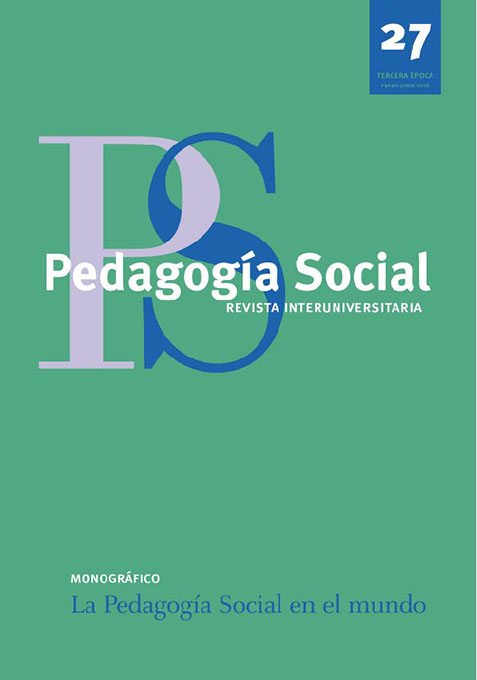Educación social en Japón
DOI:
https://doi.org/10.7179/PSRI_2016.27.12Palabras clave:
social education, lifelong learning, Kominkan (community education center), community development, self-education, socialization of education, sozialpädagogikResumen
El concepto que corresponde a pedagogía social en Japón es ‘educación social’. El propósito de este artículo es esclarecer la realidad de la educación social en Japón, a través del debate sobre la his- toria, teoría, metodología, profesionalización y práctica de la educación social en Japón. El objetivo de la edu- cación social es lograr la realización personal individual organizando sistemáticamente tanto la enseñanza académica oficial como la extraoficial, y de la concentración en la última para contribuir a la mejora de la sociedad. También busca la realización de un capital social en la comunidad. La realización de una sociedad mejor y de la realización personal a nivel individual compone la filosofía del bienestar social. Aunque las ma- neras de abordar la educación social y el bienestar social son diferentes, se puede decir que comparten la misma filosofía.
En los últimos años, se ha intentado integrar la educación social y la asistencia, con el fin de desarrollar unas prácticas consolidadas estructuralmente en algunas comunidades. Administrativamente, es un desafío para el regionalismo burocrático, y el problema yace en las disposiciones en cuanto al personal a cargo de su práctica. Es posible crear una práctica de Asistencia de Educación Social en las comunidades designando a unos empleados que estén a cargo de la educación social y a otros que se ocupen de la asistencia social. Ambos grupos cooperarán y trabajarán juntos, y la práctica llevada a cabo mediante la cooperación entre ambas plantillas propiciará el desarrollo de la comunidad y también de la estructura del gobierno de la misma.
En el futuro, se busca el desarrollo de las comunidades con el propósito de la realización de una sociedad mejor a través de las prácticas de la asistencia social y de la educación. La estructura de Asistencia de Educación Social planteada a nivel comunitario sugerirá el camino que ha de tomar la educación social en Japón en años venideros.
Descargas
Citas
Kobayashi, S. (2008). Modern Social Education: Lifelong Learning and Social Education Personnel. Kurein: Press.
Kobayashi , S., Kataoka, R., & Hirakawa, K. (Eds.). (2014) The Introduction to Lifelong Learning. Eidell: Kenkyusho. Matsuda , T. (2004) Foundation of Social Education in Modern Japan. Kyushu: University Press.
Matsuda, T. (2007). Reexamination of Community Values in Social Education: Through Reinterpretation of the Con- cept of Social Education. The Japanese Journal of Educational research. Vol.74, No.4, December, 518-529.
Matsuda , T. (Ed.). (2015) Diverse Aspects and Issues of Social Pedagogy: Comparative Study Between Asian and Western Countries. Daigakukyouiku: Press.
Matsuda , T. (2014). Redefinition of Social Education and Community Governance: The possibility of Social Pedagogy. Fukumura:Press.
Murata, Y., Yamaguchi, M. (Eds). (2010). A Bilingual Text Education in Contemporary Japan –System and Con- tent-, [s.l.]: Toshindo
Nagashima, S. (2006) The Historical Meaning and Limitation of Jiyudaigaku-undo (Free University Movement), Keizai Shirin (The Hosei University Economic Review), Vol. 74 (1 2), 169-201.
Saruyama, T. (2014). Communication and ‘Recording’ in Tsurumi Kazuko’s Seikatsu-kiroku Movement: History of the learning organization ‘Seikatsu wo tuzuru kai’’, The Japan Society for the Study of Adult and Com- munity Education, Japanese journal of adult and community education, 50(2), 11-20.
The Japan Society for the Study of Adult and Community Education (Ed.). (2009) Building Learning Community: New Profession of Social Education. Toyokan Press.
Descargas
Archivos adicionales
Publicado
Cómo citar
Número
Sección
Licencia
Derechos de autor 2015 Pedagogía social. Revista interuniversitaria

Esta obra está bajo una licencia Creative Commons Reconocimiento-NoComercial 3.0 Unported.
Derechos de reproducción y archivo
La versión publicada de los artículos podrá ser autoarchivada por sus autores en repositorios institucionales y temáticos de acceso abierto. No obstante la reutilización total o parcial de los mismos en nuevos trabajos o publicaciones deberá ser autorizada por Pedagogía Social. Revista Interuniversitaria.
Los trabajos publicados deberán ser citados incluyendo el título de la Revista, Pedagogía Social. Revista Interuniversitaria, nº, páginas y año de publicación.
Responsabilidades éticas
Pedagogía Social. Revista Interuniversitaria no acepta material publicado anteriormente en otros documentos. Los/as autores/as son responsables de obtener los permisos oportunos para reproducir parcialmente material de otras publicaciones y citar correctamente su procedencia. Estos permisos deben solicitarse tanto al autor/a como a la editorial que ha publicado dicho material.
Es obligación de Pedagogía Social. Revista Interuniversitaria detectar y denunciar prácticas fraudulentas.
En la lista de autores/as firmantes deben figurar únicamente aquellas personas que han contribuido intelectualmente al desarrollo del trabajo.
La revista espera que los/as autores/as declaren cualquier asociación comercial que pueda suponer un conflicto de intereses en conexión con el artículo remitido.
Los autores deben mencionar en el manuscrito, preferentemente en el apartado del método, que los procedimientos utilizados en los muestreos y controles han sido realizados tras la obtención de consentimiento informado.
La revista no utilizará ninguno de los trabajos recibidos con otro fin que no sea el de los objetivos descritos en estas normas.
Aviso de derechos de autor/a
© Pedagogía Social. Revista Interuniversitaria. Los originales publicados en las ediciones impresa y electrónica de esta Revista son propiedad del Pedagogía Social. Revista Interuniversitaria, siendo necesario citar la procedencia en cualquier reproducción parcial o total.
Salvo indicación contraria, todos los contenidos de la edición electrónica se distribuyen bajo una licencia de uso y distribución “Creative Commons Reconocimiento-No Comercial 3.0 España” (CC-by-nc). Puede consultar desde aquí la versión informativa y el texto legal de la licencia. Esta circunstancia ha de hacerse constar expresamente de esta forma cuando sea necesario.






